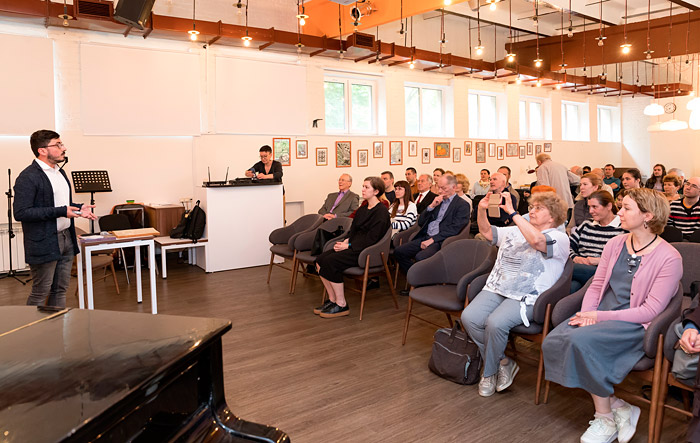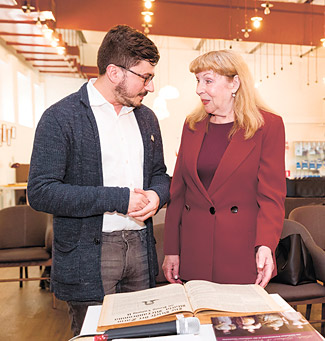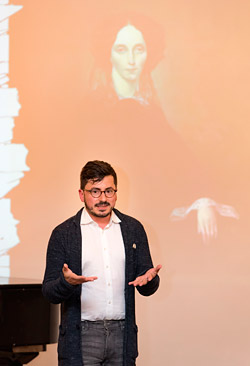
Electronic english version since 2022 |
The newspaper was founded in November 1957
| |
|
Number 22 (4619) |
Creative work of JINR staff
Journey to the 19th century
Our Institute is a center of attraction for enthusiastic people. This is spoken about in different words and metaphors. This is evidenced by numerous concerts, exhibitions, creative meetings with interesting people. And a person becomes interesting when he does not limit himself to official duties, but manages to do something useful for society: he preserves and supplements history, creates works of art and engages in educational activities. And here's another example. On 3 June, the JINR Universal Public Library hosted a lecture by Adviser to JINR Director on International Cooperation Irek Suleimanov, Candidate of Pedagogical Sciences, Germanist, author of 30 scientific and nonfiction papers. He was lucky enough to take part in deciphering and translating into Russian letters and diaries of an amazing person on the Russian throne - Empress Maria Alexandrovna (1824-1880), nee Princess of Hesse-Darmstadt. The lecture "Empress Maria Alexandrovna: Epistolaries and Fate" tells about her life, character traits, peculiar heritage, as well as little-known facts are given.
"Empress Maria Alexandrovna was a figure not in the front row of Russian historiography," I. Suleimanov began the lecture. "For us, people who live 200 years later, this person exists in the artifacts that she left behind, largely epistolary: letters, diaries. June 3 is a special day - exactly 142 years ago Maria Alexandrovna left this world."

The wife of Emperor Alexander II, Maria Alexandrovna, born Maximilian Wilhemina Augusta Sophia Maria, was from Darmstadt, the capital of the Duchy of Hesse. Her personality was perceived by some contemporaries ambiguously due to the prevailing doubts about legitimacy - the ruling house of the Romanovs could not afford such scandals. An active interest in this person arose much later, in particular, in the 1930s-1940s of the last century and solid publications on this topic came out in Germany. Historians found out that Maria Alexandrovna participated in the reforms carried out by her husband, had access, on a par with the emperor, to all reports from embassies, political decisions were made jointly by the spouses. Besides, running the charitable department of the institutions of Empress Maria, she also headed a large ministry that included several hundred schools, almshouses and shelters.
 Amazing documents are stored in the State Archive of the Russian Federation - Maria Alexandrovna's school notebooks. They include exercises in translation from other languages. On the covers of the notebooks there are carefully drawn monograms of a young Hessian princess. Obviously, Maria Alexandrovna thought about high status, while still a child. Although opinions are divided about her accession to the throne: in Russia they believe that Alexander II, by chance, met her during a long trip to Europe and in Germany - that her fate, even in infancy, was arranged by her mother thanks to family ties with Russian and European monarchs.
Amazing documents are stored in the State Archive of the Russian Federation - Maria Alexandrovna's school notebooks. They include exercises in translation from other languages. On the covers of the notebooks there are carefully drawn monograms of a young Hessian princess. Obviously, Maria Alexandrovna thought about high status, while still a child. Although opinions are divided about her accession to the throne: in Russia they believe that Alexander II, by chance, met her during a long trip to Europe and in Germany - that her fate, even in infancy, was arranged by her mother thanks to family ties with Russian and European monarchs.
The peculiarity of working with letters and diaries was the absence of a unified Latin alphabet that we deal with in the modern world. Thus, the German language had its own style, font. So, depending on the spelling, it was possible to determine in which language a particular word was used, similar in spelling in different languages.
Being brought up in the grand duke's house, Maria Alexandrovna had the opportunity to study European languages and she mastered Russian only after her marriage - the famous poet and translator Vasily Zhukovsky taught her. And she used Russian selectively, in those cases when it was most suitable for expressing thoughts. For example, she called one of her younger sons Paul in her letters (his name is found in the diaries in the German style) and he was brought up in a European manner - several marriages, an active, adventurous life. She called her other son Sergey in Russian - and he grew up a deeply religious man, was the Moscow Governor-General.
 Maria Alexandrovna herself was also distinguished by her religiosity - being a Protestant in her girlhood, she thought a lot about Catholicism and about religion in general. And the transition to Orthodoxy in view of her marriage was an easy and meaningful step for her - she sincerely believed that it was much closer to Christian ideals. In her epistolary documents, graphic images of crosses are often found and almost all entries in her diaries end with an appeal to the Lord.
Maria Alexandrovna herself was also distinguished by her religiosity - being a Protestant in her girlhood, she thought a lot about Catholicism and about religion in general. And the transition to Orthodoxy in view of her marriage was an easy and meaningful step for her - she sincerely believed that it was much closer to Christian ideals. In her epistolary documents, graphic images of crosses are often found and almost all entries in her diaries end with an appeal to the Lord.
The correspondence with N.Pirogov about the organisation of sanitary affairs during the hostilities was mentioned in the lecture. From the correspondence with Elizabeth of Prussia, and this is about 1000 letters, it becomes clear that in Russia they adopted the system of interaction between a medical institution and a monastery from the Duchy of Hesse to help the poor patients - years later, institutions such as the Marfo-Mariinsky Convent of Mercy began to appear on this basis.
I.Suleymanov said that representatives of the Elisabeth-Sergius Educational Society turned to him for help in translating. Perhaps it was assumed that the documents would be in Russian. However, the frame turned out to be German. At the same time, other languages were delicately woven into it. Russian, of course, played a special role in this language canvas. It can be called sacred - Maria Alexandrovna wrote a poem in Russian on the death of her son, turned to God in her revelations. At the same time, the names of officials are mentioned in French transcription, then it was the language of international communication. The role of English was not so great.
I.Suleimanov showed the guests of the event the original of the first publication of the correspondence between Maria Alexandrovna and Ludwig II of Bavaria (Munich newspaper "Heimat", 1930). Of course, it is impossible to convey all the nuances mentioned in a newspaper format and most likely, they cannot be contained in one lecture. It is also to be regretted that such speeches are not recorded - under the auspices of the Joint Institute, events sometimes take place in parallel and employees should be able to view such unusual meetings at a more convenient time.
We thank Director of the JINR Universal Public Library Maria Pilipenko for her help in preparing the material.
Galina MYALKOVSKAYA,
photo by Elena Puzynina